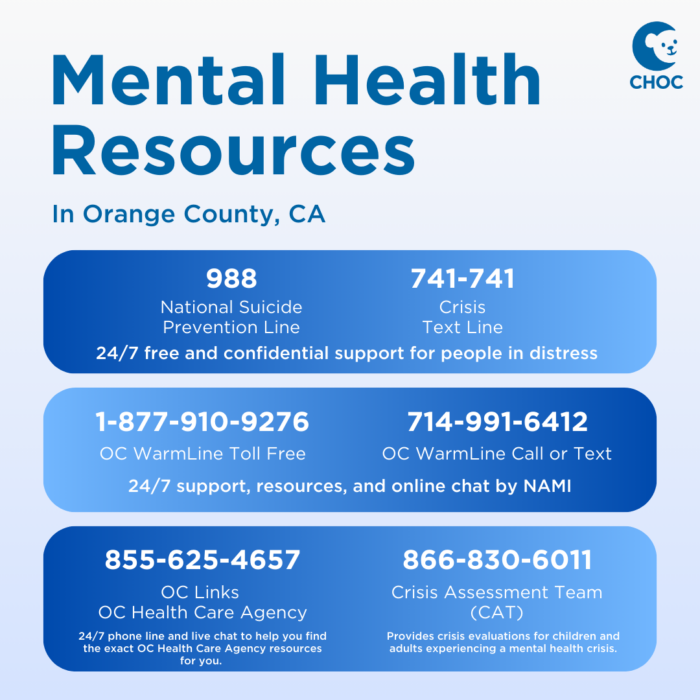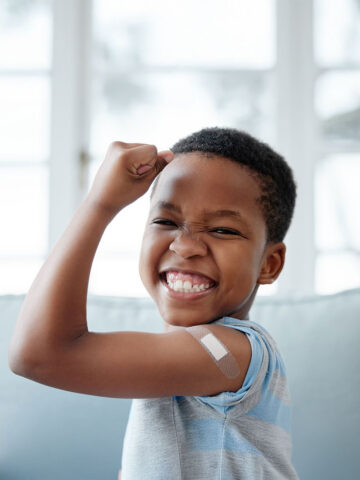Over-the-counter medication safety tips and suicide prevention
With the COVID-19 pandemic, traumatic world events, media consumption and social pressures, children and teens are already under immense pressure. Now with the back-to-school season in full swing, they are facing the added pressure of schoolwork, extra-curricular activities and social lives, which could possibly amplify stress, anxiety, depression and feelings of isolation.
With that in mind, a CHOC psychologist warns parents against the potential for children and teens to overdose on medications found in the home.
For many of the pediatric patients that Dr. Missi Nadeau has treated for attempted suicide, the culprit, though, isn’t prescription medications. Rather, children and teens are reaching for what is accessible and commonly found in home medicine cabinets: acetaminophen, ibuprofen, and diphenhydramine (commonly known as Tylenol, Motrin, and Benadryl).
These children and teens are seeking a means of escape. Dr. Nadeau says, “They are in serious distress and attempting suicide. They are seeking relief.”

Featured
The COVID-19 pandemic has been linked to increased suicidal thoughts. Learn how to help your kids.
The following symptoms are common among people who may have overdosed on medication:
- Vomiting
- Erratic behavior
- Confusion
- Drowsiness
- Changes in heart rate
- Stomach pain
One of the biggest symptoms of an overdose is excessive vomiting. If this is happening to your child, it’s important to make sure they are positioned with their head tilted down to prevent aspirating — or breathing vomit into their airway. Call 911 or take them to your nearest emergency department.
Protect your medications at home
To protect your children and teens from overdosing on over-the-counter medications, Dr. Nadeau recommends:
- Lock up all your medications – not only your prescriptions. Small medical lock boxes are relatively inexpensive and can be purchased online and at most large retailers.
- Personally dispense all medications, including over-the-counter medications and perscriptions, to your children and explain that you or another trusted adult must be the ones to give them medicine.
- Educate your children and teens about the potential for over-the-counter medication toxicity.
Dr. Nadeau urges, “Even if 50% of parents lock up over-the-counter medications, there would be 50% fewer cases of overdoses in the emergency department. It’s a simple safety step for a big problem.”
Look for the warning signs
These suicide attempts are not limited to children or teens with diagnosed mental health illnesses. Because of the pressure of academics, social media, relationship problems with family and friends, overdoses can be caused by loneliness, feeling overwhelmed, and isolation, Dr. Nadeau says.
Dr. Nadeau encourages parents to be on the lookout for the following warning signs that their child may be in emotional distress:
- Isolating themselves from friends and family
- Their grades are dropping, and they are failing to complete and turn in their necessary assignments
- Alcohol and marijuana use
- Becoming disinterested in or quitting their extra-curricular activities
- Sleep disruption; staying in bed during the daytime
- Increased social media consumption, excessive video gaming, or binge-watching streaming movies/shows
- Outbursts and disruptive behavior – becoming quickly angered or excessively crying
- Skipping school
- Harming themselves – making cuts on their thighs and upper arms where it may not be easily noticed
- Increased interest in death, giving away possessions, texting or posting to social media final messages to friends/family
If parents notice a cluster of these behaviors from teens and children, they should contact their pediatrician. If you believe your child is in danger of hurting themselves or another person, call 911 or go to the nearest emergency department. Other resources include the National Suicide Prevention Lifeline, 988, which provides 24/7 free and confidential support for persons in distress.

Mental Health Resources
for Orange County, CA
Download and print this card with a list of phone numbers to keep on hand in case of a mental health emergency.
Communicate effectively
Parents can help their kids; they can serve as role models and leaders of their families. Dr. Nadeau offers these strategies to help parents attend to their child’s mental health:
- Ask your kids questions. Don’t accept “fine” as an answer. Ask quality questions, talk to them and find out how they are really doing.
- Trust but verify. If in question, don’t be afraid to verify who your kids are going to meet and what the real plans are.
- Monitor your child’s academic progress on their school’s parent viewer website, if possible.
- Monitor social media. Children and teens have access to unrestricted and potentially harmful information on social media and they need guidance and mentorship. Monitor how much time they are spending and what they are accessing.
Get more expert health advice delivered to your inbox monthly by subscribing to the KidsHealth newsletter here.
Get mental health resources from CHOC pediatric experts
The mental health team at CHOC curated the following resources on mental health topics common to kids and teens, such as depression, anxiety, suicide prevention and more.





